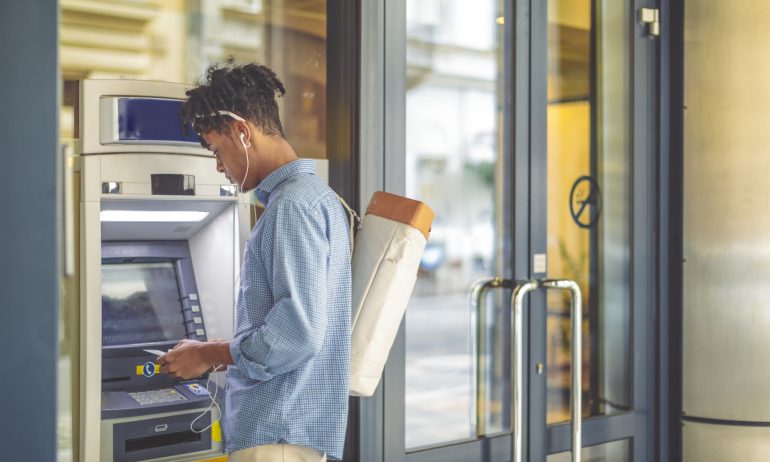Where to Exchange Currency Without Paying Huge Fees

Many or all of the products featured here are from our partners who compensate us. This influences which products we write about and where and how the product appears on a page. However, this does not influence our evaluations. Our opinions are our own. Here is a list of our partners and here's how we make money.
Quick tips for where to exchange currency
Before your trip, it’s best to do a currency exchange at your bank or credit union, which likely offers better rates and fewer and/or lower fees.
Your bank or credit union may buy back leftover foreign currency in exchange for dollars when you return.
Once you're abroad, use your financial institution's ATMs if possible; they’re the best option to exchange currency with minimal fees.
Banks and credit unions are generally the best places to exchange currency, with reasonable exchange rates and the lowest fees. Here’s how financial institutions — and a few other places — can help exchange currency near you.
» ALSO: See our list of the best ways to send money internationally
How to find a currency exchange near you
If you’re looking to exchange currency, try the following options:
Check if your bank or credit union offers currency exchange services.
Look for an online currency converter that offers cash delivery.
Outside of the U.S., you can use your bank’s ATM network to withdraw local currency.
Best place to exchange currency: Your bank or credit union
To get the best currency exchange rates, you’ll want to change money before you leave the country. Before you check out options for where to exchange money near you, figure out what the current exchange rates are by using a trusted source such as Reuters. That way, you’ll know what the going rate is and have an idea of what to expect when comparing exchange rates at banks and currency exchange service providers.
Many banks offer currency exchange to their customers. Though there may be a small fee if you exchange less than a certain amount, your bank or credit union will almost always be the cheapest place to exchange currency.
You may be able to order currency at a branch location, by phone, or online to have it delivered to you or to pick up at a branch. Some currency providers allow you to pick up your funds as soon as the next day, have it delivered within one to three business days or opt for overnight shipping.
» See our picks for the best banks for international travel
Another money-change option: online currency converters
You can also order through an online currency converter such as Currency Exchange International, which will have the cash delivered to your home. But exchange rates are less favorable, and the delivery charges may eat into your funds.
Where to exchange currency outside the U.S.
Once you’ve reached your destination, avoid airport kiosks or other exchange houses. Your bank's ATM network is likely the best option. You may be able to withdraw cash in the local currency with competitive exchange rates and low fees (1% to 3%).
Use your institution’s app to find an ATM near you. Try to withdraw larger amounts if your bank charges ATM fees. And avoid out-of-network ATMs — in addition to a possible foreign transaction fee, you could end up paying surcharges to your bank and the ATM owner.
» RELATED: See foreign debit card transaction fees by bank
If your bank doesn’t offer in-network ATMs or branches in the countries where you’re traveling, you can use your debit card at a local ATM. Keep in mind that you will typically be charged fees when using a foreign ATM.
» MORE: Learn about foreign transaction fees and how to avoid them
Where to avoid exchanging currency
Whether in the U.S. or at your destination, avoid airport kiosks or other exchange houses if you can. Those should only be used as a last resort, because they typically offer poor exchange rates and high fees, so you’ll get less currency for your money.
Skip currency exchange: Use a credit or debit card
Figure out whether your destination is card-friendly. If it is, you can avoid many of these extra travel fees with one of NerdWallet's favorite no foreign transaction fee credit cards or debit cards.
Consider applying for one of these credit cards or debit cards well before you leave (allowing ample time to process your application and receive the card in the mail) so you can use it instead of cash wherever possible. Credit and debit cards can be a safer option than cash; they offer fraud protection and safety features (such as the option to freeze them in case of misplacement), but once cash is lost or stolen, it can be impossible to recover.
Avoid using a credit card at ATMs or you’ll be hit with fees and interest right away for taking a cash advance. When making purchases at the point of sale, choose to pay in the local currency rather than in U.S. dollars to avoid currency conversion fees.
When paying with a credit card abroad, stick to cards that don’t charge a foreign transaction fee. To avoid conversion fees, pay in the local currency rather than U.S. dollars.

Member FDIC
Barclays Online Savings Account

4.35%
$0

Member FDIC
EverBank Performance℠ Savings

5.15%
$0
Exchange frequently? Consider a multicurrency account
If you live or work abroad, you might consider getting a multicurrency account. A multicurrency account is usually an account that lets you spend, receive and hold multiple currencies. Fintech companies Wise and Revolut offer multicurrency accounts online and through mobile apps. Read more about how multicurrency accounts work.

The best place to exchange currency at the end of your trip
Again, your bank is probably the best place to exchange currency, but it may not buy back all currency types. If your bank doesn’t accept the foreign currency you want to exchange, you can exchange your money at a currency exchange store or at an airport kiosk, even though you likely won’t get the best rate.
If you can’t sell your foreign currency, you may be able to donate it at the airport or in flight. Ten international airlines participate in UNICEF’s Change for Good program, which takes donations in foreign currency to help improve the lives of children worldwide.
Currency exchange: Frequently asked questions
Here are answers to common questions about the best place to get foreign currency.
Where is the best place to exchange currency?
Though there may be a small fee if you exchange less than a certain amount, your bank or credit union will almost always be the best (and cheapest) answer for where to exchange currency.
How do I find a currency exchange near me?
You can find a money exchange near you by searching online for “money exchange” and your ZIP code. You can also reach out to your local bank branch to see if it offers money exchange services.
Where can you exchange currency for free?
Some banks offer free currency exchange to their customers. Note that some financial institutions may charge a fee for exchanging currency unless you’re a premium account holder or are exchanging at least $1,000.
On a similar note...
Find a better savings account
See NerdWallet's picks for the best high-yield online savings accounts.









